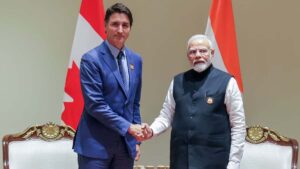 MOON Desk: The ties between the two countries have ebbed to their lowest since the assassination of Hardeep Singh Nijjar by masked gunmen in June this year. It is interesting to note that when viewed from an unbiased prism, the standpoint of both countries at the current stage seems very convincing. The Indians accuse Canada of harbouring terrorists as the Canadian government provides free rein to the Sikh community in Canada to engage in protests and provide lifeline to the Khalistan independence movement — a movement that started in the 1980s and only subsided as a result of the Indian government clampdown causing more than 22,000 deaths. Since then the Sikh community has been trying to stage a comeback and the India government doesn’t view favourably the Sikh diaspora anywhere in the world.
MOON Desk: The ties between the two countries have ebbed to their lowest since the assassination of Hardeep Singh Nijjar by masked gunmen in June this year. It is interesting to note that when viewed from an unbiased prism, the standpoint of both countries at the current stage seems very convincing. The Indians accuse Canada of harbouring terrorists as the Canadian government provides free rein to the Sikh community in Canada to engage in protests and provide lifeline to the Khalistan independence movement — a movement that started in the 1980s and only subsided as a result of the Indian government clampdown causing more than 22,000 deaths. Since then the Sikh community has been trying to stage a comeback and the India government doesn’t view favourably the Sikh diaspora anywhere in the world.
The current India-Canada standoff is a typical example of how the future challenges and threats will be different from the challenges and threats of the past. Not the potential or actual use of military force in pursuit of policy and no more the conventional threat of one power against the another, but such challenges and threats as aggressive dictatorship, coercion of weaker states, subversion and fostering of civil unrest, economic pressures, political manipulation, influencing elections, counter narrative building through media control and hardcore acts of terrorism are likely to endure. In PM Modi’s authoritarian and nationalist democratic model his aggressive dictatorship might cost India a diplomatic embarrassment as much as the inability of Canadian leadership to stand up and defend the liberal democratic order may harm the very foundations of the existence of this order.
There are two other aspects to this issue. One is how President Justin Trudeau’s poll numbers have consistently declined and Canada is home to the largest overseas communities of Indian region which number almost 1.4 million out of the total Canadian population of 40 million. If according to 2021 census, 800,000 Sikhs live in Canada then those votes are the votes that Trudeau has outright secured for his future electoral success. The other aspect is that maybe the liberal world led by the US has had enough of aggressive dictatorship of PM Modi. Maybe the global leadership sees an end of Modi era as India goes to elections in 2024 even though he is termed the most popular leader of the world with an approval rating of 78% as per the survey carried out earlier this year by the US-based consulting firm ‘Morning Consult’. It is may be for that reason that a process or course of action has been started with the mutual collaboration of the intelligence alliance of ‘The Five Eyes’. But it is one thing when PM Modi becomes a reason for India losing diplomatic face and Indian credibility in the outside world and another when the Indians go out to vote and consider otherwise.
Nationalist states created by aggressive dictators like PM Modi support populist leaders like him who consistently showcase a determinist attitude and a will and ability not only to deter but coerce the outside world. It is for this reason that the outcome of this India-Canada cold war will be very interesting. Its termination will decide what will become more trending and fashionable — an order of illiberal nationalism demanding blind loyalty to the country and its leadership or civic nationalism based on the promise of justice and equality of all citizens before the law.





